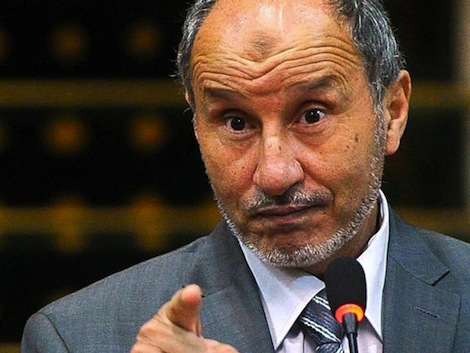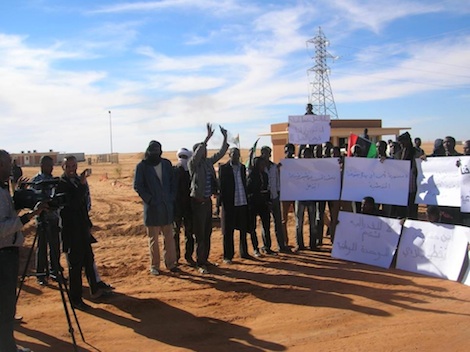By Mohamed Bujenah and George Grant.

Benghazi, 16 December:
Mustafa Abdul Jalil will stand trial “very soon” in connection with the killing of . . .[restrict]General Abdul Fatah Younis, a military prosecutor in Benghazi has informed the Libya Herald.
The former NTC chairman was questioned last week over possible involvement in the murder of Younis, who commanded revolutionary forces against Qaddafi prior to his death on 28 July last year.
The prosecutor, a colleague of the military prosecutor investigating the case, also confirmed that Jalil had been charged with two separate offences, Misuse of Powers and Committing Acts that Would Harm Libyan Unity.
“The first charge relates to his creation of the investigative committee that issued Younis’s arrest warrant, whilst the second charge relates to the fact that the consequence of that decision could have resulted in tribal conflict and damage to Libyan unity at a critical period of the revolution”, the prosecutor said.
There are also rumours of a possible third charge against Jalil, although the prosecutor denied any knowledge of it when questioned by this paper.
There is also some speculation that the investigation may result in an outcome that would lead the military prosecutor to withdraw the charges against Jalil, although this has not been confirmed.
Jalil has been strongly advised not to leave the country owing to the potentially imminent date of the trial, although contrary to some reports, his passport has not been taken from him.
Last week, the head of the military prosecutor’s office in Benghazi, Saleh Albishari, was quoted as saying that “the prosecutor did not prevent Abdul Jalil from traveling abroad but it requested from him to inform the prosecutor of the date of his travel in order not to contrast with the date of his trial.”
To date, very little of what happened to General Younis has been confirmed, and the stated purpose of the current investigation is to try and establish what actually happened.
What is known is that shortly before his death, Younis was summoned from the front by a committee of four judges with the knowledge of the NTC’s executive committee, although the NTC itself was not responsible for the order.
He was taken to a military compound on 27 July and was found dead together with two other officers the next day. Both they and their vehicle had been burned.
A senior security source in Benghazi has told the Libya Herald that the base to which Younis was taken belonged to Ahmed Bukatela, a prominent Islamist who leads the Obeida militia in the city.
Today, it was revealed that Bukatela is one of seven prominent Islamists to be named in connection with the assassinations of senior security officers in Benghazi in recent months, although there is no definitive evidence of this as yet.
The source claims that the men who brought Younis to Bukatela were not known to him, nor were they affiliated with his group. He claimed, moreover, that Bukatera had initially objected to Younis being brought to his compound, and had ordered that he not be harmed once he agreed to it. Younis was then taken from the compound in the early hours of the morning of 28 July and not heard of again.
During his testimony last week, Jalil spoke of the deep mistrust that existed towards Younis amongst many revolutionaries, and the potential threats that were made against him.
“The revolutionaries were saying at the time that this man should not be allowed to share our victory with us, when he was the very man who ordered the security brigades, during the 1980s and 1990s, to crush us down”, Jalil said.
“The revolutionaries prevented him from entering their operations room, insisting that if he did so, he would have to take responsibility for what happened to him”, Jalil continued.
The former NTC chairman also took personal responsibility for the appointment of Younis to command military operations, and that his colleagues in the NTC respected his opinion in doing so.
Jalil maintained that neither he nor any member of the NTC had anything to do with the killing of Younis and recalled how, on the contrary, he had to make several calls just to confirm the news.
“I was informed that Abdul Fatah Younis and his colleagues had been killed and I immediately contacted Ali Al-Issawi [NTC foreign affairs spokesman] who confirmed the news to me and also told me that Ibrahim Barghati [a member of the preventative security forces] also had knowledge of the incident. I then contacted Ibrahim and he too confirmed the news.
Jalil also recounted a short-lived debate over how to announce the news of Younis’s death, with his body, at this point, yet to have been discovered.
“I immediately travelled to Benghazi and found a plenary session of the National Transitional Council and the Executive Council underway at the Tibesti hotel. They were debating the wording of the statement that needed to be issued to the public; whether they should say that Abdul Fatah Younis and his colleagues were killed, despite the fact that there were no bodies found yet, or just to say, at that point, that they were kidnapped by unknown assailants and that every effort would be made by the NTC and the Executive Council to find them.
“They all opted for the first choice, which is to say that Younis and his companions had been killed, because prior to my arrival, they listened to the testimonies of several people, including a man named Abdul-Fattah Al-Msheiti, who confirmed to them the killing of Younis and his colleagues. Moreover, the second option, which was to say that an unknown assailants had abducted them, would most likely put us in even more awkward position.” [/restrict]








